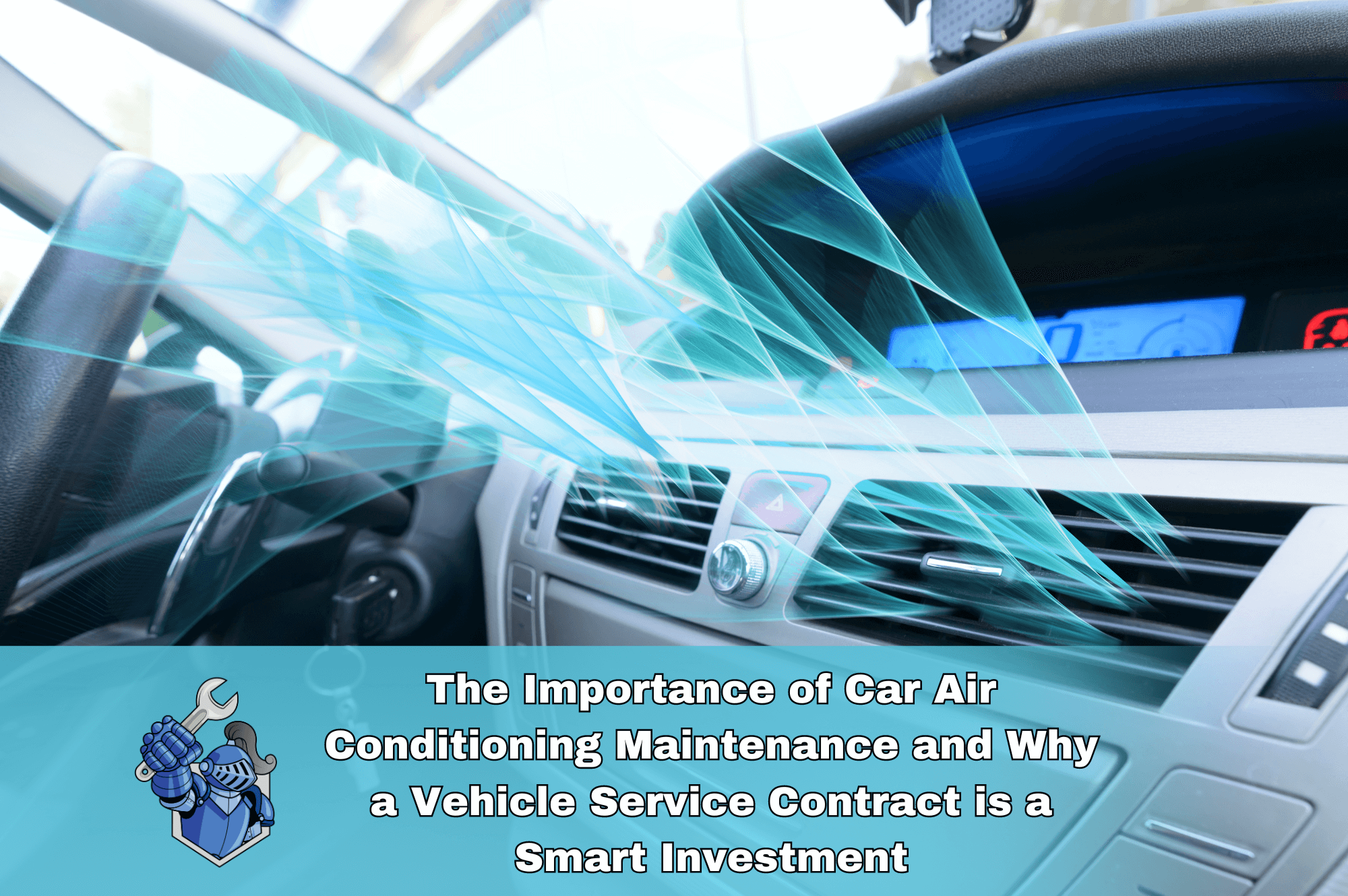With summer temperatures soaring, a functional car air conditioning (AC) system is not just a luxury—it's a necessity. For families with young children, elderly passengers, and even pets, a working AC can make the difference between a pleasant drive and an unbearable one. In this blog, we'll discuss the essential care and maintenance of car air conditioning systems and why investing in a vehicle service contract is a smart move to ensure your comfort and peace of mind.
Understanding Your Car's Air Conditioning System
Your car's AC system is a complex network of components designed to cool and dehumidify the air inside your vehicle. It comprises several key parts:
- Compressor: The heart of the system, the compressor, pumps refrigerant throughout the system.
- Condenser: This component cools the refrigerant and turns it into a liquid.
- Evaporator: Located inside the cabin, the evaporator absorbs heat from the air and transfers it to the refrigerant.
- Expansion Valve: This regulates the flow of refrigerant into the evaporator.
- Refrigerant: A chemical compound that transitions from gas to liquid to cool the air.
Common AC Problems and How to Address Them
To ensure your AC system works efficiently, regular maintenance is crucial. Here are some common problems and tips for maintenance:
- Refrigerant Leaks: Over time, refrigerant can leak due to worn seals or damaged hoses. Regularly check for leaks and have them repaired promptly. If you notice the AC isn't cooling as it should, it might be a sign of low refrigerant levels.
- Dirty Filters: The AC filter traps dust, pollen, and other particles. A clogged filter can restrict airflow and reduce cooling efficiency. Replace or clean the filter every 12,000 to 15,000 miles.
- Faulty Compressor: The compressor can fail due to electrical issues, refrigerant leaks, or lack of lubrication. Regular inspections can catch compressor problems early, saving you from costly repairs.
- Electrical Issues: Faulty wiring or blown fuses can disrupt the AC system's operation. Periodically inspect the electrical components and replace any damaged parts.
- Condenser Blockages: Debris and dirt can block the condenser, reducing its ability to cool the refrigerant. Clean the condenser regularly to ensure optimal performance.
The Importance of Regular AC Maintenance
Regular maintenance not only ensures your AC system works efficiently but also extends its lifespan. Here are some maintenance tips to keep your AC in top shape:
- Schedule Regular Inspections: Have a professional inspect your AC system at least once a year, ideally before the summer season. They can identify and fix minor issues before they become major problems.
- Keep the Condenser Clean: Regularly check and clean the condenser, especially if you often drive on dirt roads.
- Check the Refrigerant Level: Low refrigerant levels can damage the compressor and reduce cooling efficiency. Ensure the refrigerant is topped up during your regular car service.
- Run the AC in Winter: Running the AC occasionally during winter helps keep the system lubricated and prevents the seals from drying out.
- Replace Cabin Air Filter: A clean cabin air filter ensures better air quality and efficient AC operation. Replace it every 12,000 to 15,000 miles or as recommended by your vehicle manufacturer.
Why a Vehicle Service Contract is a Smart Investment
Despite regular maintenance, AC systems can still fail unexpectedly, leading to expensive repairs. This is where a vehicle service contract becomes invaluable. Here’s why:
- Cost Savings: AC repairs can be costly, especially if major components like the compressor or condenser need replacing. A vehicle service contract covers these expenses, saving you money.
- Peace of Mind: Knowing that your AC system is covered gives you peace of mind. You won't have to worry about unexpected repair bills disrupting your budget.
- Comprehensive Coverage: Service contracts often cover a wide range of repairs, not just the AC system. This comprehensive coverage ensures your vehicle remains in top condition.
- Convenience: With a service contract, you can have your vehicle repaired at authorized service centers, ensuring quality repairs and genuine parts.
- Increased Vehicle Value: A vehicle with a service contract is often more attractive to buyers. It signifies that the car has been well-maintained and comes with added protection.
Choosing the Right Vehicle Service Contract
When selecting a vehicle service contract, consider the following:
- Coverage: Ensure the contract covers major AC components like the compressor, condenser, and evaporator.
- Reputation: Choose a reputable provider with positive customer reviews and a history of reliable service.
- Cost: Compare the cost of the service contract with potential repair costs to determine if it's a worthwhile investment.
- Terms and Conditions: Read the fine print to understand what's covered, what's not, and any additional costs like deductibles.
Conclusion
Maintaining your car's air conditioning system is crucial for comfort and safety, especially during hot weather. Regular maintenance can prevent many common issues and extend the life of your AC system. However, unexpected breakdowns can still occur, leading to costly repairs. A vehicle service contract offers financial protection and peace of mind, ensuring you and your passengers stay cool and comfortable all summer long.
Investing in a vehicle service contract is a smart decision for any car owner. It provides comprehensive coverage, saves you money on repairs, and increases your vehicle's value. Don't let the heat get the best of you—protect your AC system and enjoy a comfortable ride every time you hit the road.
For more information on car care and vehicle service contracts, visit our Learning Center.
FAQ
Q: How often should I have my car's AC system inspected?
A: It's recommended to have your AC system inspected at least once a year, ideally before the summer season.
Q: What are the signs of low refrigerant levels in my car's AC system?
A: Common signs include reduced cooling efficiency, hissing noises from the AC, and visible leaks under the vehicle.
Q: Can I clean the AC condenser myself?
A: Yes, you can clean the condenser by removing debris and using a garden hose to gently wash away dirt. However, be careful not to damage the fins.
Q: What should I do if my car's AC system isn't cooling properly?
A: Check the refrigerant levels, clean or replace the cabin air filter, and ensure the condenser is free of blockages. If the issue persists, have a professional inspect the system.
Q: How can a vehicle service contract help with AC repairs?
A: A vehicle service contract covers the cost of repairs for major AC components, saving you money and providing peace of mind.
For additional resources, you can explore more about car AC maintenance from AAA and NAPA Auto Parts.
Stay cool and comfortable on the road by taking care of your car's air conditioning system and considering a vehicle service contract from NobleQuote.
Suggestions for you
Read MoreLet’s work together
Every week we showcase three charitable organizations that our donations are sent to. Our clients are able to choose which of these three will receive their gift when they add coverage to their vehicle...




